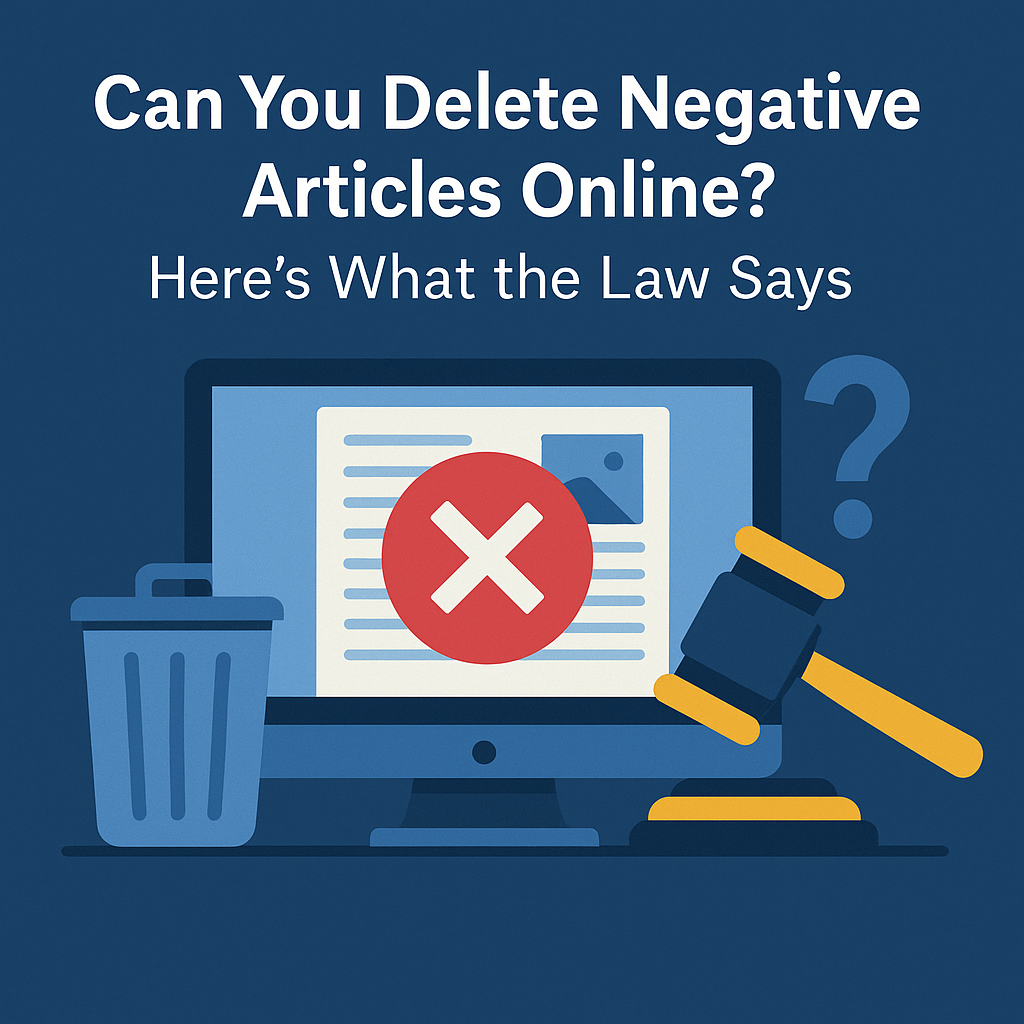Estimated reading time: 5 minutes
A single article can shape how the world sees you. Whether it stems from a past arrest, business dispute, or unfounded allegations, negative media content can seriously damage your personal or professional reputation. But can you really delete these articles from the internet? The answer is complex—and largely depends on legal jurisdiction, content ownership, and platform policies.
This comprehensive guide explores your legal rights, strategic options, and how experts like online reputation repair firms Defamation Defenders help individuals and businesses fight back.
Table Of Content
Understanding Online Article Persistence
Once published and indexed, negative articles can:
- Appear prominently in Google Search results
- Be syndicated to other platforms or aggregators
- Persist indefinitely in web archives like the Wayback Machine
- Spread across social media, forums, and blogs
These long lifespans mean that proactive management is essential. If ignored, a single piece of negative press can:
- Ruin job opportunities
- Damage relationships
- Undermine business deals
- Trigger reputational crises
Additional Visibility Amplifiers:
- Google Alerts sharing damaging headlines
- Reddit, Discord, and niche forums linking and discussing
- Screen captures spreading via image boards and reaction content
Legal Grounds to Remove Online Content
Removing online articles isn’t as simple as hitting “delete.” However, there are legal levers you can pull.
1. Defamation and Libel Claims
If the article contains false statements presented as fact that harm your reputation, you may have grounds for a defamation suit.
Legal requirements:
- A false statement of fact (not opinion)
- Publication to a third party
- Harm caused to your reputation
- Negligence or actual malice by the publisher
Action: Send a cease-and-desist letter. If ignored, escalate to litigation.
What You Need to Prove:
- Intent to harm (for public figures)
- Financial damage or emotional distress
- Third-party corroboration or supporting affidavits
2. Invasion of Privacy Claims
If the article discloses private, non-newsworthy information without consent, you may claim invasion of privacy.
Examples:
- Revenge content
- Private medical or financial records
- Non-consensual images
Statutory Backing: Many states have specific privacy laws for private individuals and minors.
3. Right to Be Forgotten (EU and California Residents)
In certain jurisdictions, individuals have a legal right to request the removal of outdated or irrelevant information from search engines.
Learn more: European Court of Justice ruling on RTBF
Non-Legal Strategies That Work
Sometimes, legal removal isn’t an option—but that doesn’t mean you’re powerless.
Suppression SEO (Search Engine Optimization)
Reputation experts use white-hat SEO to bury negative content under positive assets.
Tactics include:
- Publishing press releases
- Creating authority blogs and bios
- Launching YouTube channels or interviews
- Wikipedia editing (if eligible)
- Medium.com, LinkedIn articles, and third-party interviews
Content De-indexing
If you can’t delete the article, you can sometimes remove it from Google search results.
Options include:
- Filing a Google removal request for outdated or sensitive content
- Submitting a DMCA takedown (for copyright violations)
- Using Google’s impersonation or revenge porn tools
Platform-Specific Reporting
Each major platform has its own policy regarding harassment, defamation, or privacy violations.
Examples:
- Facebook Reporting Tools
- X (Twitter) Harassment Reporting
- Google Legal Removal Requests
- Trustpilot Content Removal
Reputation Damage: How It Shows Up
- Autocomplete Defamation: Google suggests “[your name] fraud” or similar phrases
- Knowledge Panels include misleading affiliations
- Image Search Results show mugshots or defamatory memes
- Featured Snippets pull quotes out of context
- Google Discover may recommend the content
Impact by Profession:
- Doctors/Lawyers: Loss of patients or clients
- Entrepreneurs: Lost funding or business deals
- Public Figures: Harassment and canceled opportunities
Case Studies: Real Content Removal Wins
Case A: Wrongfully Accused Professional
A CPA was falsely accused of financial fraud in a syndicated article. Defamation Defenders submitted a takedown request with a supporting legal affidavit. The site agreed to a retraction and removal.
Case B: Revenge Porn Victim
An influencer was the target of non-consensual photo leaks. After proving identity and intent, Defamation Defenders used California SB-1322 protections to force removal from multiple hosting platforms and Google.
Case C: Business Defamation Campaign
A startup faced a smear campaign by a former employee. We implemented link suppression, DMCA claims, and local SEO boosting, replacing all negative mentions on page one within four months.
What NOT to Do
- Don’t respond angrily in comments. This fuels visibility.
- Don’t contact the journalist directly if you’re emotionally upset.
- Don’t pay shady “removal” services offering guarantees for money up front.
- Don’t sue unless you have legal standing. Frivolous lawsuits can backfire.
When to Involve a Professional
Consider hiring a professional if:
- The article ranks on page one for your name or brand
- It involves criminal accusations, nudity, or defamation
- You’ve tried DIY tactics with no results
- You want to combine legal and SEO strategies
- You’re under ongoing attack from competitors or trolls
How Defamation Defenders Can Help
We specialize in:
- SEO-based suppression
- Strategic removals via legal and non-legal means
- Crisis communication
- Review and social cleanup
- Personal branding and content campaigns
👉 Request your free removal consultation
Frequently Asked Questions (FAQ)
Not if it’s true and a matter of public interest. But false or misleading content may qualify as defamation.
Sometimes. If the content violates a platform’s policies, you can often self-submit a removal request.
Not directly. You must get the content removed at the source or submit a legal order.
Removals can take 1–6 months, depending on complexity and legal involvement.
Yes—when done strategically. Over time, positive content can replace the harmful material in rankings.
Yes. Reputation services like Defamation Defenders work with attorneys, publishers, and SEO teams to clean up your online footprint.
Usually yes, but web archives and republications may require secondary cleanup.
Content syndication complicates removal but doesn’t make it impossible. A combination of DMCA, outreach, and suppression can still yield strong results.
Only if it meets the criteria for defamation, invasion of privacy, or ongoing reputational harm under current legal precedent.
Yes—many states have new laws requiring mugshot takedown, especially if charges were dropped or expunged. Learn more at your state’s AG website.
Related Contents:




